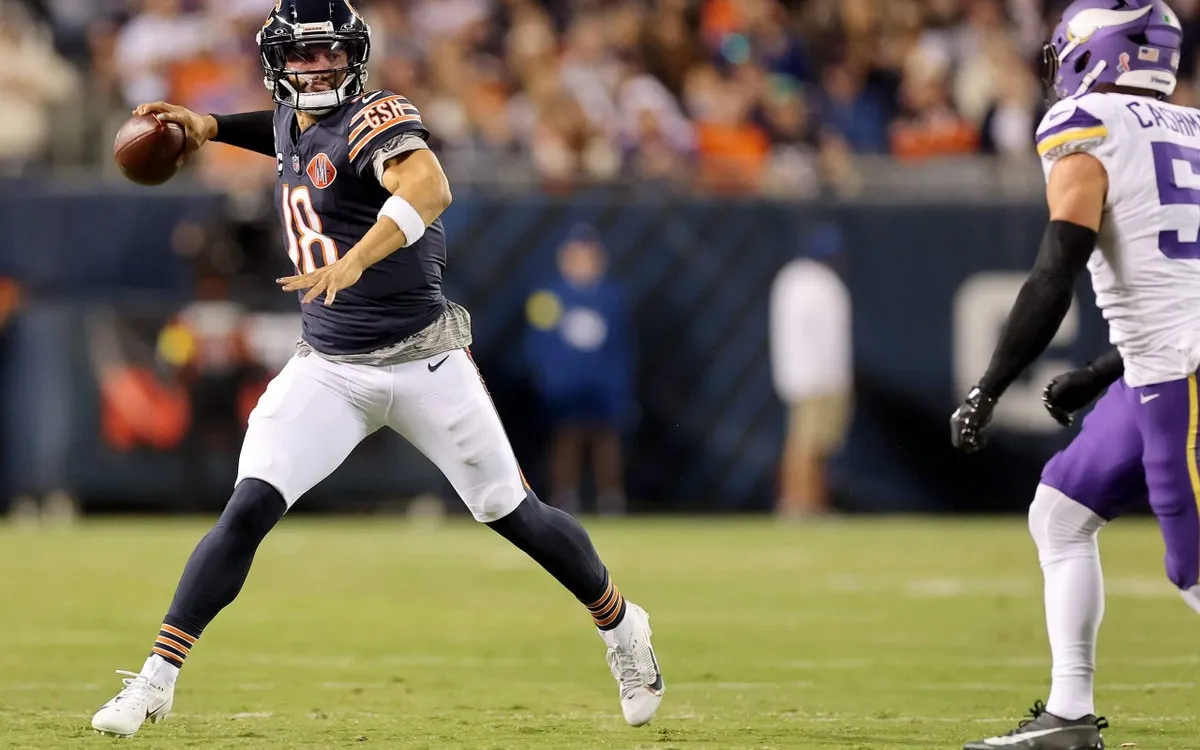
In a thrilling yet disappointing match on Monday night, the Chicago Bears showcased a glimpse of hope for their fans during a 5-minute and 41-second drive that felt like a turning point for the team. The much-anticipated Caleb Williams demonstrated his potential, completing 6 of 6 passes during a 10-play, 61-yard drive that ended with a 9-yard touchdown run, putting the Bears ahead by seven points. This performance marked a significant moment in Williams' young career, as he embodied the aspirations of the Bears' coaching staff to achieve a completion rate of 70 percent this season.
Caleb Williams' opening sequence was nothing short of remarkable. Not only did he go on to complete his initial six passes, but he also extended his streak to an impressive ten completions, becoming the first Bears quarterback to achieve this feat since at least 1978. However, as the game progressed, the Bears' momentum dwindled, leaving fans to wonder if the initial spark was merely a flash in the pan. Following the Bears' 27-24 loss to the Minnesota Vikings, offensive coordinator Ben Johnson remarked, "Williams started off really well... it certainly felt like it dried up a little bit,” attributing the shift to adjustments made by the Vikings' defense.
At halftime, Caleb Williams boasted an impressive completion percentage of 81.2%, having gone 13-for-16. However, the second half proved to be a stark contrast, where he struggled, completing only 8 of 19 passes for a dismal 42.1 percent. This drop in performance was reflected in his EPA (expected points added) per dropback statistic, which registered at -0.18, according to TruMedia. Williams acknowledged the challenges he faced post-halftime, stating, "It starts with getting in and out of the huddle, and being able to complete some easy passes, checkdowns, things like that, keep the drives going." The Bears' offense faltered, failing to replicate the efficiency of that electrifying opening drive.
One pivotal moment came during the second quarter when Johnson opted for an aggressive play on fourth-and-3 from the Vikings' 24-yard line. Williams had wide receiver DJ Moore open but unfortunately misfired, showcasing how critical moments can define a game. This theme continued into the third quarter, with missed throws to both Moore and tight end Cole Kmet, which left Williams frustrated. "Those are big moments in the game," he reflected, emphasizing the importance of capitalizing on scoring opportunities.
Statistics revealed that Williams faced significant pressure, being blitzed on 30 percent of his drop-backs in the first half, which increased to 43.5 percent after halftime. This uptick in defensive aggression could have impacted his decision-making and accuracy. Additionally, the Bears' offense was hindered by penalties and a lackluster run game, compounding Williams' struggles as the game progressed. A missed field goal attempt by Cairo Santos further deflated the team's spirits, especially following a responding touchdown from the Vikings.
As the Bears prepare for a challenging matchup against the Lions following their disappointing loss, questions linger regarding which version of Caleb Williams will emerge. Will he replicate the precision of the first half or the inaccuracy of the second? Offensive coordinator Declan Doyle emphasized the importance of "pass game efficiency," stating that success hinges on making the right reads and utilizing available outlets. Williams demonstrated that capability early in the game, but must work to maintain that level of performance throughout.
In the end, while the Bears' opening drive showcased the potential of Caleb Williams, the inconsistency that followed raises concerns. With a short week ahead, the coaching staff and Williams must find a way to harness that early success and translate it into a more cohesive and effective offensive performance. As Williams himself stated, "It’s frustrating... something that you have to hit in those moments." The Bears are counting on him to deliver in crucial situations moving forward.